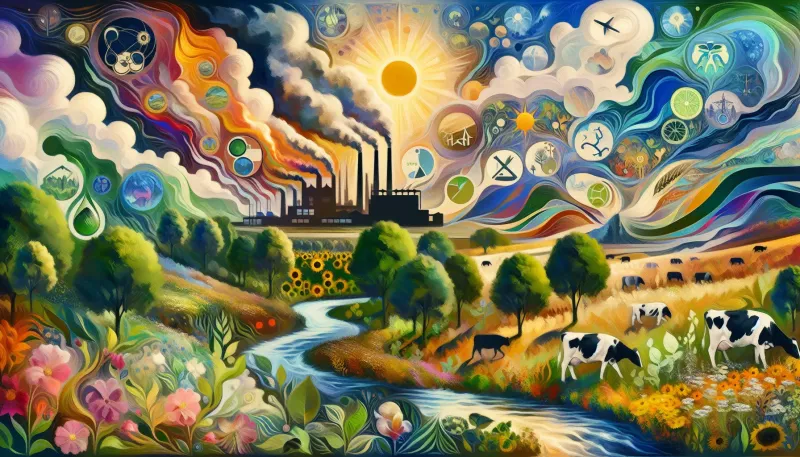The Surprising Environmental Impact of a Vegan Diet

Explore the surprising environmental impact of a vegan diet. Learn how plant-based eating can benefit the planet and what factors you need to consider.
The conversation around diet and the environment is becoming increasingly prominent. One diet that often comes up in these discussions is the vegan diet. Often praised for its ethical and health benefits, many don't realize the profound environmental impact of adopting a vegan lifestyle. This article explores how a vegan diet and environmental impact are intricately linked and the various ways it benefits our planet.
Understanding the Vegan Diet
Before diving into the environmental implications, it is essential to understand what a vegan diet entails. A vegan diet excludes all animal products, including meat, dairy, eggs, and honey. Instead, it focuses on plant-based foods such as vegetables, fruits, grains, nuts, and legumes.
Carbon Footprint Reduction
The Role of Livestock in Greenhouse Gas Emissions
One of the most significant ways a vegan diet impacts the environment is through the reduction of carbon footprints. Livestock farming is a leading contributor to greenhouse gas emissions, producing methane, nitrous oxide, and carbon dioxide. According to the Food and Agriculture Organization of the United Nations, livestock is responsible for approximately 14.5% of global greenhouse gas emissions.
By eliminating animal products, which requires energy-intensive processes for breeding, feeding, and waste management, individuals can significantly reduce their carbon footprint.
Plant-Based Diets and Lower Emissions
In contrast, plant-based diets lead to lower greenhouse gas emissions. Research shows that the production of plant-based foods results in fewer emissions compared to their animal-based counterparts. For instance, growing vegetables and grains requires less resources and produces fewer emissions than raising cattle.
Water Conservation
Livestock Water Use
Water scarcity is a pressing issue globally, and livestock farming is a major consumer of freshwater. Producing meat, dairy, and eggs requires significant amounts of water not only for the animals themselves but also for growing their feed.
Reduced Water Footprint
Research from the Water Footprint Network has shown that the water footprint of animal products is much higher compared to plant-based foods. For example, producing one kilogram of beef requires approximately 15,000 liters of water, whereas producing the same amount of vegetables requires between 322 and 1,052 liters. Adopting a vegan diet can help conserve freshwater resources and reduce overall water consumption.
Land Use and Deforestation
The Land Requirements for Animal Agriculture
Animal agriculture requires vast amounts of land for grazing and growing feed crops. This demand for land often leads to deforestation, particularly in tropical regions like the Amazon rainforest.
Preserving Forests with Plant-Based Diets
A plant-based diet requires significantly less land than an animal-based diet. By reducing the demand for meat and dairy, we can alleviate the pressure on forests and natural habitats, allowing them to thrive and continue to capture carbon from the atmosphere.
Impact on Biodiversity
The Threat to Wildlife
Animal agriculture also poses a threat to biodiversity. The expansion of agricultural land for livestock feed has led to habitat loss for many species, contributing to the decline of wildlife populations.
Promoting Biodiversity through Veganism
By shifting to a vegan diet, natural habitats are preserved, allowing diverse ecosystems to flourish. This transition can play a significant role in combating extinction and promoting biodiversity.
Challenges and Considerations
Seasonal and Local Produce
While the overall impact of a vegan diet is largely positive, it is important to consider the sourcing of food. Opting for seasonal and local produce can further reduce emissions associated with transportation and storage.
Environmental Impacts of Industrial Farming
Another consideration is the environmental footprint of industrial-scale plant farming. Monocropping and the extensive use of pesticides and fertilizers can harm soil health and local ecosystems. Supporting sustainable and regenerative agricultural practices can mitigate these effects.
Conclusion
Adopting a vegan diet offers a multitude of environmental benefits, from reducing greenhouse gas emissions and conserving water to preserving land and promoting biodiversity. While there are challenges to consider, such as the sourcing of produce and the practices of industrial farming, the positive impact of plant-based eating on the planet is substantial. By making informed and conscientious choices, individuals can significantly contribute to a more sustainable and healthy world.



























